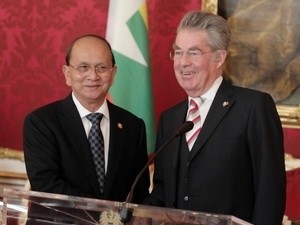(VOVworld) – Myanmar’s President Thein Sein on Tuesday arrived in Belgium, the fourth leg of his first European tour as a President, which began last week. The visit aims to deepen Myanmar’s relations with the West. VOV’s Hong Van comments on Myanmar – EU cooperation opportunities.
 |
| Austrian President Fischer and Myanmar President Thein Sein (Source: AFP) |
Thein Sein’s tour of five European countries aims to realize the cooperative opportunities that he and leaders of Norway, Finland, Austria, Belgium, and Italy discussed on the sidelines of the Asia-Europe Meeting in Vientiane, Laos, late last year and during recent visits by these nations’ officials to Myanmar. In Norway, one of the European countries that have strongly supported Myanmar’s recent changes, leaders discussed official development assistance, environmental protection, and economic cooperation. In Austria, President Thein Sein admitted that Myanmar’s shortage of capital and advanced technologies is due to 20 years of economic sanctions. He called on Austria to lift its sanctions against Myanmar. Austrian President Heinz Fischer agreed to Thein Sein’s appeal and pledged Austrian support for Myanmar’s reforms.
Ahead of his visit to Belgium where the Myanmar leader plans to discuss with EU officials human rights, economic reforms, and reconciliation in north Myanmar, Thein Sein called on the EU to permanently lift all sanctions.
Strengthening relations with the EU can only benefit Myanmar, a country in need of resources for growth since the EU partially suspended sanctions last April. European investment in Myanmar is about 3.5 billion USD, a modest figure. Expansion of cooperation with the West will help Myanmar access capital, technology, and management skills for future development. Myanmar’s geographical advantages, natural resources, abundant labor force, and untapped market make it an attractive investment destination for EU members.
The ties between Myanmar and the EU began to prosper when President Thein Sein enacted reforms after taking office in 2011. The country freed hundreds of political prisoners, encouraged freedom of press, allowed opposition parties to participate in the national political arena, and opened the door to foreign investment. These changes led to the EU’s suspending all sanctions against Myanmar last April except for an arms embargo. EU President Jose Manuel Barroso committed 100 million USD of ODA to Myanmar and inaugurated an EU representative office in Yangun. Last September, the European Commission approved a proposal to reinstate Myanmar’s status within the EU’s Generalized System of Preferences. Under the plan, since the beginning of this year, Myanmar will be able to export its products – except for arms and ammunition – duty-free and quota-free to the EU. Meanwhile the Paris Club creditor countries have cancelled 6 billion USD of Burmese debt.
All this doesn’t mean that relations between EU and Myanmar are completely smooth. Concerns remain about ongoing conflicts in the northern state of Kachin and tensions between Buddhists and Islamists in the western state of Rakhine.
Last June, opposition leader Aung San Suu Kyi visited Europe, a trip considered an important political milestone for Myanmar. Thein Sein’s visit continues to show Myanmar’s desire to enhance cooperation with the continent and boost relations between the EU and ASEAN of which Myanmar is a member.
Hong Van